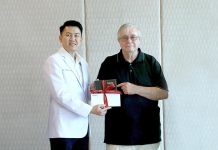The stimulus for this week’s article came from poor old Ms. Hillary who had received a letter on the subject of pharmaceutical costs. The subject matter did not fit her column, so it was passed on to me.
The price of medicines is always a contentious subject – and not just in Thailand. In Australia “brand name” drugs are more expensive than “copy” (generic) drugs. However, there is a good reason for the brand name being more expensive than the generic. The pharmaceutical companies spend millions of dollars to develop, test and get licensing for new drugs, costs not borne by the makers of the generics, after the patents expire. But some manufacturers do not wait for the patents to expire and the ‘copy’ drug will also be cheaper.
In Thailand, many drugs can be bought over the counter (OTC), which may or may not be a good thing. Self diagnosis and self prescribing can be dangerous. That is why I believe that doctors should be prescribing, and pharmacists should be checking and supplying. If most drugs are only available through pharmacies world-wide, on the prescription of a doctor, is it safe to just buy OTC, without any doctor’s advice?
I believe it is not safe. As the American Food and Drug Administration (FDA) reports in its website, “Patients who buy prescription drugs from websites operating outside the law (or OTC as in Thailand) are at increased risk of suffering life-threatening adverse events, such as side effects from inappropriately prescribed medications, dangerous drug interactions, contaminated drugs, and impure or unknown ingredients found in unapproved drugs.”
The FDA goes on to warn “… certain drugs be dispensed only with a valid prescription because they are not safe for use without the supervision of a licensed health care practitioner. Generally, before the practitioner issues a prescription for a drug the patient has never taken before, he or she must first examine the patient to determine the appropriate treatment. Subsequently, the patient receives the drug from a registered pharmacist working in a licensed pharmacy that meets state practice standards.”
Now returning to the local situation and the plethora of pharmacies on every major road (there are three within 50 meters of my home for example), how many of them are “legal”? How many are actually staffed by registered pharmacists?
With so many, and competing against hospital pharmacies on price alone, the only way they can make a good profit is to buy cheaper copies of brand names and sell them OTC. There is also the situation where the local pharmacies will sell the restricted (some prescription only, and others hospital only) drugs. Prime examples of this are the ‘blue diamonds’, which are supposedly only available on prescription from a licensed physician. In the letter that Hillary passed on, the writer received Prednisolone tablets from his local pharmacy. Prednisolone is a hospital only restricted drug in Thailand. The law was again thwarted.
According to the World Health Organization, WHO has been fighting drug counterfeiting since it became a major threat in the 1980s. The problem was first noticed by the pharmaceutical industry. They saw that their own products were being copied, and it went on from there.
In fact, the WHO estimates that 25 percent of medications bought in street markets in developing countries are fake. My own experience in some of the poorer SE Asian countries has been that another 50 percent are real but out of date, leaving around 25 percent genuine manufacturer’s stock.
Some authors say that the figures are even worse than that. An international study published in Tropical Medicine and International Health in 2004 found that 53 percent of Artesunate tablet packs sold in the region did not contain Artesunate, a vital antimalarial drug. You can see the danger.
According to WHO, drugs commonly counterfeited include antibiotics, antimalarials, hormones and steroids. Increasingly, anticancer and antiviral drugs are also faked. And you can add to that, the ‘blue diamonds’. Never forget the phrase “Caveat emptor” (Let the buyer beware).
You have been warned. Get your medications on prescription from a hospital or large registered pharmacy you can trust.
Like all things in life, you get what you pay for.




